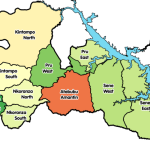At a time when the digital divide looms large, threatening to widen the gap between the haves and the have-nots, a groundbreaking initiative is taking root in Africa. Born from a partnership between the visionary Africa Diaspora Central Bank and the Eco-6 region, in collaboration with the Vanuatu Trade Commission to Ghana, this bold venture aims to catapult Africa into the global tech spotlight.
With a mission to train 5 million African youths in Artificial Intelligence (AI), starting with Ghana, this initiative stands as a powerful testament to Africa’s resolve to leapfrog into the Fourth Industrial Revolution (4IR).
This ambitious program, set to transform the lives of 300,000 Ghanaians with a robust, stimulus-free training package, marks a significant leap towards bridging the technological and financial divides that have long plagued the continent. In a region where a staggering 60% of Sub-Saharan Africans are cut off from basic banking services and internet access trails far behind the global norm, the challenges to financial and technological inclusivity are daunting.
These gaps do more than hamper economic growth; they curtail Africa’s competitive edge on the world stage. However, this initiative emerges as a beacon of hope against this backdrop, promising not only to impart crucial AI skills but also to foster economic empowerment, with each trainee receiving the equivalent of $100 in AKL 6.26.

The launch event, slated for April 30th, 2024, at the prestigious British Council at 10 am, promises to be a historic occasion, bringing together government officials, academic leaders, traditional authorities, and key stakeholders from various sectors, including trade unions and state-owned enterprises. This gathering is a vivid illustration of the broad-based support and collaborative ethos underpinning this initiative, showcasing a collective dedication to pushing the boundaries of technological education and financial accessibility.
In essence, this initiative is more than just a training program; it’s a clarion call for the entire continent to rally behind a vision of technological empowerment and financial inclusion. As Africa stands on the brink of a technological renaissance, this initiative lights the path forward, promising to equip its youth with the tools and knowledge to not only navigate but also shape the future of the global digital landscape.
Eco-6 AI Africa Training Stimulus Package
In the heart of Africa, amidst its vibrant cultures and dynamic societies, a transformative initiative is unfolding—one that promises to redefine the continent’s trajectory towards technological mastery and economic prosperity.
The AI Africa Training Stimulus Package, a beacon of innovation and progress, is set to ignite the potential of millions of young Africans, equipping them with the skills to thrive in the Fourth Industrial Revolution (4IR). This ambitious project, aimed at addressing the significant skill deficit and surging unemployment rates, is more than an educational program; it’s a comprehensive strategy to foster financial inclusiveness and eradicate poverty through the power of Artificial Intelligence (AI).

The initiative’s scope is vast, covering critical areas such as AI Prompt Engineering, Deep Learning, and Machine Learning—skills that are indispensable in today’s and tomorrow’s technological landscape. However, what sets this program apart is not just the curriculum but the calibre of expertise driving its implementation. The commitment to excellence is underscored by the engagement of seasoned instructors, each a luminary in their respective fields, bringing a wealth of knowledge and experience to the forefront of this educational crusade.
Further elevating the initiative’s promise of quality and impact is the partnership with Knowledge Web Center, a leading consulting firm renowned for its prowess in AI implementation and the creative force behind the revolutionary ScholarWriteAI.
As the consulting partner handling this monumental project, Knowledge Web Center brings to the table a deep understanding of the intricacies of AI and a proven track record of successful implementations across various sectors. This collaboration ensures that the training delivered is not only cutting-edge but also practical, tailored to meet the demands of the global marketplace and empower participants to become innovators and leaders in their communities and beyond.

The AI Africa Training Stimulus Package transcends the conventional boundaries of education, offering a holistic approach that integrates communities, state institutions, traditional authorities, and educators from universities to basic levels across all 16 regions of Ghana. This inclusive strategy guarantees that the benefits of AI education reach the furthest corners of the continent, democratizing access to knowledge and opportunities for innovation.
This initiative is a clarion call to Africa’s youth, urging them to seize the moment and embrace the tools and knowledge that will enable them to shape the future. It’s an investment in human capital, a commitment to nurturing the next generation of tech-savvy leaders who will drive Africa’s digital transformation. As the continent stands on the brink of a new era of technological and economic growth, the AI Africa Training Stimulus Package shines as a testament to what can be achieved when passion meets purpose, when education meets innovation, and when Africa’s potential is fully unleashed.
A Brief History of Eco 6
The Economic Community of the Six Regions (ECO-6) initiative, launched through the collaborative efforts of the Joint Statute of ECO-6 and the United Kingdoms of Africa in 2021, represents a monumental step towards bridging economic disparities, fostering sustainable development, and enhancing integration among its member regions. This initiative, including the African Diaspora as the 6th region recognized by the African Union, aims to harness the vast potential of the Diaspora as a critical partner in Africa’s developmental journey.
By embracing the Diaspora as an integral component of its growth strategy, ECO-6 underscores the importance of leveraging skills, resources, and knowledge from across the globe to fortify Africa’s growth and resilience.
With a structured framework that encompasses a parliamentary system for deliberative, decision-making, and collaborative processes, ECO-6 embarks on a mission to unify African countries, territories, and Diaspora communities towards a common goal of shared prosperity and development. Supported by various treaties and agreements, ECO-6’s foundation is solidified through legal and institutional mechanisms that guide its objectives, governance, and operational directives, aiming to promote economic integration, cultural exchange, and sustainable development across the African continent and its Diaspora.

At the governance core of ECO-6 lies the Eco-6 and Global Commonwealth of New Africa Interregional Court of Justice, alongside key bodies such as the African Diaspora Central Bank (ADCB) and the House of Kings, each playing pivotal roles in advancing the initiative’s goals. The ADCB, tasked with monetary policy and financial stability, spearheads the introduction of the LUMI currency, aiming to foster economic growth and integration across the Diaspora.
Meanwhile, the House of Kings serves as a cultural beacon, preserving the identity and heritage of African peoples and promoting unity among diverse communities. This inclusive governance structure, enriched by the Eco-6 House of Kings Interregional Supreme Court Act, outlines a judicial framework that upholds justice and legal integrity, ensuring that Eco-6’s vision for unity, economic development, and self-sufficiency is pursued with unwavering dedication and legal rigour.
Through its comprehensive legal and institutional framework, ECO-6 aspires to knit a tapestry of member states, territories, and constituents, unified in their quest for African economic emancipation, cultural integrity, and collective prosperity, guided by principles laid out in the Eco-6 Treaty and supported by a commitment to justice, economic innovation, and the sustainable, inclusive growth of the African Diaspora.
Pioneering Financial Inclusion
In an era where technological advancement and financial access define the boundaries of global inclusion, the launch of the LUMI currency emerges as a beacon of innovation, heralding a new chapter in Africa’s quest for economic empowerment and sustainable development. This initiative is not merely about introducing a new currency; it’s a bold declaration of Africa’s resolve to bridge the vast technological skill gap and address the pressing issue of financial inclusion head-on.

With each LUMI unit backed by 100kWh of solar energy equivalent to 4 grains of gold, this currency transcends the traditional confines of financial systems, weaving the principles of sustainability and renewable energy into the very fabric of Africa’s economic landscape.
This strategic move has not only garnered acclaim across 190 countries but has also positioned Africa as a vanguard in the global economy, championing sustainable and inclusive financial practices. The universal acceptance of the LUMI stands as a testament to the global community’s endorsement of Africa’s innovative approach towards surmounting the twin hurdles of financial exclusion and environmental degradation.
The significance of the LUMI initiative extends far beyond its innovative financial model. In a continent where the World Bank estimates that nearly 66% of Sub-Saharan Africa remains unbanked, the LUMI serves as a critical tool in democratizing access to financial services. By facilitating engagement with the digital economy via platforms such as “Swiffin/HanyPay,” the LUMI empowers millions, catalyzing a wave of economic opportunities for individuals and businesses alike.
This is particularly impactful in regions historically marginalized by conventional banking systems, marking a pivotal shift towards financial inclusivity. The choice of solar energy as the backbone of the LUMI currency not only underscores Africa’s commitment to renewable energy sources but also positions the continent as a leader in the adoption of green economic models. This is a remarkable stance, especially considering Africa’s minimal contribution to global carbon emissions, and highlights a proactive strategy in combating climate change and promoting environmental sustainability.
The advent of the LUMI currency heralds an era of transformation for the African continent, intertwining financial inclusion, economic empowerment, and environmental stewardship. As the LUMI continues to build momentum globally, it embodies the collective aspiration for an Africa that is not just integrated and prosperous but also sustainably developed. This initiative marks a crucial step forward in ensuring that Africa and its people transition from being on the periphery of the global economy to leading it with innovation, unity, and sustainable growth.
Conclusion
The AI Africa initiative transcends the traditional confines of a training program, rising as a profound call to action for the entire African continent. It beckons a unified movement towards harnessing the transformative power of Artificial Intelligence (AI) and technology, marking the dawn of a new chapter in African innovation and technological advancement.
With Ghana pioneering this ambitious journey, it sets a precedent for other nations across the continent, each poised to receive their bespoke training stimulus packages. This endeavour is not merely an opportunity; it is a clarion call to kindle the flames of technological prowess across Africa, preparing its burgeoning youth population for the myriad opportunities and inevitable challenges posed by the Fourth Industrial Revolution (4IR).
This initiative is imbued with a vision that looks beyond merely adapting to future technological landscapes; it is about actively crafting those futures. Through the empowerment of African youth with critical AI skills, the continent is strategically positioning itself not just as a participant but as a leader in the impending technological revolution. This is about laying the groundwork for Africa to assert a significant presence in the global digital economy, leveraging technology and innovation as pivotal drivers for economic growth, poverty alleviation, and enhanced inclusivity.
The forthcoming launch of this program heralds more than the initiation of a training agenda; it signifies the onset of a transformative era for Africa. An era where technology and innovation are not imported ideals but homegrown forces propelling the continent towards unprecedented levels of prosperity and development. By equipping its youth—the very backbone of its future—with the tools, knowledge, and skills in AI, Africa is not just preparing for the future; it is actively shaping a vision of it where the continent stands tall as a beacon of technological innovation, economic resilience, and inclusive growth.
In essence, the AI Africa initiative is a testament to the continent’s resolve to navigate the complexities of the 4IR with grace, agility, and foresight. It encapsulates a collective aspiration towards a future where every African nation is empowered by technology, where every young African is an architect of innovation, and where the continent at large is a vibrant ecosystem of development and prosperity. This is more than a program; it is Africa’s bold stride towards a future illuminated by the limitless potential of AI and technology.
















